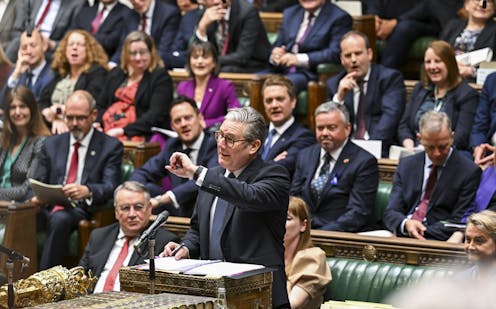
The U-turn is a long and, depending on your point of view, honourable or dishonourable tradition in British politics. Now Keir Starmer has been accused of following this tradition after heavily hinting the UK government is reconsidering last year’s decision to deny the winter fuel allowance to millions of pensioners.
As a reminder, the winter fuel payment is a lump sum of £200 or £300 paid to pensioner households to help pay heating bills. Last year, the government restricted eligibility to those who qualify for pension credit or other income-related benefits, in order to save £1.4 billion.
This was followed by months of pressure from Labour MPs that has intensified since the local elections. Starmer seemed to confirm at prime minister’s questions on May 21 that the government would change the threshold (by how much remains unclear), allowing more pensioners to qualify for the payment.
Want more politics coverage from academic experts? Every week, we bring you informed analysis of developments in government and fact check the claims being made.
Sign up for our weekly politics newsletter, delivered every Friday.
One view is that this is a belated but ultimately sensible recognition, in the wake of Labour’s drubbing at the local elections, that the policy was hurting the party badly. On the other hand, in giving in to pressure to ditch it, the government may be setting a dangerous precedent. Capitulate on this and Labour’s anxious backbenchers would soon be demanding Starmer and Rachel Reeves go back on their intention to cut billions from the welfare budget.
Both takes are essentially correct. Polling evidence points to the removal of the allowance being one of the most unpopular measures announced by the government since it came to power in 2024. Regardless of the £22 billion “black hole” in the public finances, taking a universal benefit away from a bunch of people who are regarded by most voters as uniquely deserving was bound to be as politically toxic as it was (arguably) financially rational.
The only question now is quite how far Starmer’s rethink on the payment to pensioners will go. He has said the government will look at changing the income threshold that determines eligibility, but has not said by how much.
One has to ask whether a change along those lines would actually constitute a U-turn at all. By definition, a U-turn is a 180-degree reversal of a previous commitment. In this particular case, that would mean restoring the allowance to everyone in receipt of a state pension, irrespective of their income or wealth.
This is not merely semantic nitpicking, a pointy-headed demand for terminological exactitude. It’s a deeply political question.
Will a complicated (and costly) mitigation of the policy be sufficient – symbolically and substantively – to cut through to a disappointed electorate? And will Starmer be able to convince the public that this is a government holding its hand up, admitting it got it wrong, and determined now to do the right thing?
How to U-turn
Successful U-turns have tended to be big and bold. The best example, perhaps, is John Major’s announcement after he took over from Margaret Thatcher in 1990 that he was scrapping the poll tax. “Scrapping” is the operative word: unlike Thatcher, he didn’t try to preserve the principle of a per person charge by getting the Treasury to subsidise individuals’ bills. Instead, he returned to financing local government via a charge to households rather than every adult within them.
And as for the parliamentary precedents, history teaches us that once a government’s MPs realise they can prevent it from doing something they’re convinced will harm their chances of re-election, they will try to do exactly that – however much the policy makes long-term sense for the nation as a whole. Just look at how “Nimby” (not in my back yard) Tory backbenchers continually scuppered the last government’s attempts to get more houses built in those parts of the country that needed them most.
That’s not to say that Starmer and Reeves won’t now get their way on welfare cuts (or “welfare reform” as they like to frame the issue). Labour has a massive majority, and its MPs aren’t (yet) as habituated to rebellion as their Conservative counterparts became over the course of their party’s 14 years in power.
What’s more, we are still four years from a general election, and the media narrative around “benefit cheats” means voters are far more inclined to support cuts to welfare than, say, the NHS.
Whether, then, Starmer’s U-turn (if, indeed, we should really be calling it that) works – whether electorally or in terms of his ability to force his backbenchers to accept measures they don’t like – remains to be seen.
Unfortunately for him, he faces something of a paradox. In order to convince the public, he should probably go the whole hog; but doing so may well render his life at Westminster rather trickier than he would like it to be.
No surprise there, perhaps. After all, “Politics,” the economist JK Galbraith once suggested to US President John F. Kennedy, “is not the art of the possible. It consists in choosing between the disastrous and the unpalatable”.
Tim Bale does not work for, consult, own shares in or receive funding from any company or organisation that would benefit from this article, and has disclosed no relevant affiliations beyond their academic appointment.
This article was originally published on The Conversation. Read the original article.







